Rubio’s “crusade” against UNRWA shows US bias on Gaza aid
Analyst Mouin Rabbani says the US Secretary of State's UNRWA rejection shows Washington’s partisan Gaza stance.
Source link
Analyst Mouin Rabbani says the US Secretary of State's UNRWA rejection shows Washington’s partisan Gaza stance.
Source link
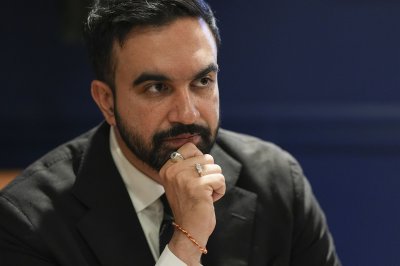
Oct. 24 (UPI) — U.S. House Democratic Party leader Hakeem Jeffries on Friday endorsed Democratic Socialist Zohran Mamdani for New York City mayor, 11 days before the Nov. 4 election.
Jeffries hasn’t issued a public statement but his endorsement was confirmed in a statement to The New York Times, with sources telling USA Today and Politico about the House minority leader’s plans.
Early voting begins Saturday.
Mamdani, who was born in India and raised in Uganda, is attempting to become the city’s first Muslim mayor.
Jeffries, who serves Brooklyn in New York, had held off endorsing Mamdani, who is a state assembly member serving Queens since 2020.
The state’s two U.S. senators, Kirsten Gillibrand and Chuck Schumer, the minority leader, haven’t endorsed Mamdani.
Mamdani has been endorsed by New York Gov. Kathy Hochul and Attorney General Letita James.
Also, he has been backed by New York Reps. Jerry Nadler, Adriano Espaillat and Yvette Clarke. Two other House members, Ritchie Torres and Dan Goldman, have said they don’t plan to endorse in the election.
And New York Democratic Party Chairman Jay Jacobs said he doesn’t plan to endorse him.
In the June 24 primary, Mamdani, 34, defeated former New York Gov. Andrew Cuomo, 67, and Mayor Eric Adams, 65. His opponents then chose to run as independents, but Adams dropped out on Sept. 28 and endorsed Cuomo on Thursday.
Mamdani is favored to defeat Cuomo and Republican Curtis Sliwa, 71, a Guardian Angels founder and radio show host. President Donald Trump has pressured Sliwa to drop out to give a better chance for Cuomo over Mamdani, whom he has labeled as a Communist.
Jeffries told The New York Times said they have had “areas of principled disagreement,” including Israel’s war in Gaza, but agreed on other matters, such as the desire to retain New York Police Department Commissioner Jessica Tisch.
“Zohran Mamdani has relentlessly focused on addressing the affordability crisis and explicitly committed to being a mayor for all New Yorkers, including those who do not support his candidacy,” Jeffries wrote.
“In that spirit, I support him and the entire citywide Democratic ticket in the general election.”
Jeffries first met with Mamdani in July in Brooklyn before the primary. They met again in August.
Jeffries had said he was focused on the federal government shutdown rather than the New York City race.
“Stay tuned,” he told reporters this week in Washington. “I have not refused to endorse. I have refused to articulate my position, and I will momentarily, at some point, in advance of early voting.”
Jeffries has questioned how Mamdani would implement his policies and combat antisemitism and gentrification.
“We’ve got to figure out moving forward how we turn proposals into actual plans so that he is successful if he becomes the next mayor, because we need the city to be successful,” Jeffries told CNN last month.
Jeffries noted that his district, which includes historically Black communities, has “been subjected to gentrification and housing displacement.”
Mamdani has sharply criticized Israel and the war in Gaza, which Mamdani describes as genocide.
During Wednesday’s debate, he said: “I look forward to being a mayor for every single person that calls the city home. All 8.5 million New Yorkers, and that includes Jewish New Yorkers who may have concerns or opposition to the positions that I’ve shared about Israel and Palestine.”
Hundreds of rabbis had signed a letter criticizing him.
And powerful real estate and finance industries have donated millions of dollars to political action committees opposing his candidacy.
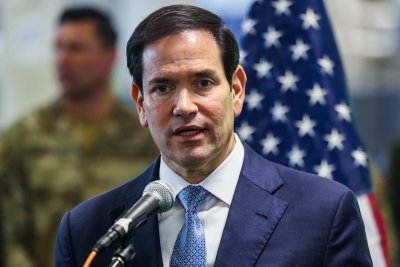
Oct. 24 (UPI) — Secretary of State Marco Rubio said that diplomats will help American military officers monitor the cease-fire in Israel and Gaza.
Rubio is visiting Israel as part of a series of visits by American officials that have been in Israel this week.
While touring the new Civil-Military Coordination Center in Kiryat Gat Friday, Rubio made the comments.
“There’s going to be ups and downs and twists and turns, but I think we have a lot of reason for healthy optimism about the progress that’s being made,” The New York Times reported that Rubio said.
Steven Fagin, ambassador to Yemen, will lead the effort at the center, the State Department said.
A reporter asked on Friday if Israel would need to apply for permission from the United States to resume fighting. “I wouldn’t phrase it that way,” Rubio responded, The Washington Post reported. “The bottom line is that there’s no nation on Earth that’s contributed more to help Israel and its security.”
Israelis have been increasingly alarmed at the United States’ presence in the cease-fire, wondering how much control America will have over Israel.
The United States is also committed to Israel’s long-term security, including ensuring that Hamas is demilitarized, Rubio said.
There is “no plan B,” he said. “It’s not just the United States. … Over two dozen countries signed onto this, including regional Arab countries … that there would be a demilitarized Gaza and that there would not be a Hamas with the capability to threaten Israel.”
On Thursday, a far-right faction in the Israeli parliament, the Knesset, voted to annex the West Bank, drawing rebuke from President Donald Trump, Rubio and Vice President JD Vance.
Trump, in an interview with Time Magazine, said that he would not allow it.
“We don’t think it’s going to happen,” Trump said. “Because I gave my word to the Arab countries. Israel would lose all of its support from the United States if that happened.”
Earlier this week, Vance arrived in Israel with Special Envoy Steve Witkoff and investor Jared Kushner. They opened the CMCC in Israel, and Vance said the peace plan is “durable.”
Rubio said he plans to join Trump in Qatar to fly to Asia this weekend to attend leadership summits in Malaysia and South Korea, the Post reported. He said he also plans to visit Japan.
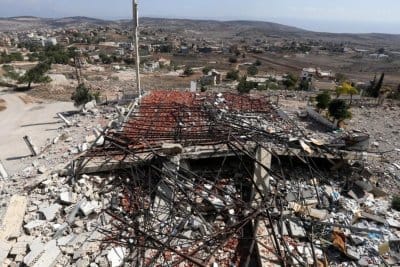
This is a view of rubble of what once was the Meis Al Jabal public secondary school in in the Marjayoun district of southern Lebanon, on Monday. The school had been hit by Israeli air strikes during the war between Israel and Hezbollah. Photo by Wael Hamseh/EPA
BEIRUT, Lebanon, Oct. 24 (UPI) — The inhabitants of southern Lebanon continue to live under the shadow of war, enduring near-daily Israeli airstrikes, intensive shelling and persistent drone activity that inflict further casualties and destruction, deepen suffering and shatter what remains of daily life.
A cease-fire accord brokered by the United States and France on Nov. 27 intended to end Israel’s devastating war against the Iran-backed Shiite Hezbollah militant group has failed to halt hostilities or restore calm to the embattled region.
Interpreting the truce accord as granting it the right to respond to any emerging threat, Israel has continued its attacks without restraint across southern Lebanon and beyond.
The post-truce phase has proven even more difficult and uncertain than the war itself, which began on Oct. 8, 2023, when Hezbollah entered the conflict by opening a front in support of Gaza.
Suspected Hezbollah positions and efforts to prevent the group from regrouping and rearming have not been Israel’s only targets. The strikes now also include private construction equipment businesses, bulldozers, excavators and anything related to rebuilding while showing no restraint toward civilians — whether in vehicles, on motorcycles or even at home.
The most intense strikes occurred Oct. 11, targeting bulldozer and excavator yards in the al-Msayleh area, where more than 300 vehicles worth millions of dollars were destroyed. One Syrian passerby was killed, and seven people, including two women, were wounded.
A week later, a quarry and cement-asphalt factory in the village of Ansar, in the Nabatiyeh district, was hit by another Israeli attack and destroyed. Israel claimed that the targeted facilities were being used by Hezbollah to produce cement for rebuilding infrastructure that had been demolished during the war — an allegation strongly denied by the plant’s managing director.
“We are a 100% civilian institution and have nothing to do with anything else,” Ali Haidar Khalifeh, who is running the targeted cement factory, told UPI. “We are a registered company with around 70 employees and a large-scale production, serving dozens of clients, distributors and suppliers from across all regions of Lebanon.”
Khalifeh, who estimated the losses at more than $15 million, said it was inconceivable to hide “weapons, missiles or military infrastructure” in the plant.
“The enemy [Israel] needs no excuse or reason. … The message is clear: it is forbidden to rebuild,” he said. “It is also meant to frighten businessmen and investors, to keep them away from southern Lebanon.”
Even civilian engineers, who assist in assessing the damage inflicted on houses and villages during the war, have been threatened and targeted.
Tarek Mazaraani was one of them. He, his family and neighbors endured a frightening experience when an Israeli drone flying over several villages in southern Lebanon broadcast a voice message calling his name and warning that he was “dangerous,” telling people to keep away from him.
At first, when his friends started sending him videos of the drone, Mazraani thought it was a joke. He soon realized it was “something serious.”
His three sons, including 8-year-old twins, began to cry, while neighbors in the compound where he was temporarily living in the village of Zawtar al-Sharkiyeh in the Nabatiyeh district rushed to his house to bid farewell before leaving for safer locations. His family packed their belongings and went to relatives in a nearby village, while he quickly headed to Beirut.
“I was surprised. … I am a simple civilian engineer and don’t belong to any party or provoke anyone,” Mazraani told UPI, adding that he felt guilty for his family and neighbors, who had to “live through the tension” and leave their homes.
He asked why Israel had “created all this terror” if its intention was to kill him, adding, “They could have done so without even a warning.”
It could well have been a warning to him and others not to deal with Hezbollah, directly or indirectly. Earlier this year, while unemployed, he briefly worked as part of a team of engineers assessing war damage with “Jihad al-Binaa,” a Hezbollah-affiliated development and reconstruction organization.
Probably, he said, his other “sin” was trying to help displaced people return to their border villages, which had been reduced to rubble during the war, and seek compensation.
Mazraani was forced to leave his border village of Houla, where his house had been badly damaged by intensive Israeli bombardment. He then established the “Gathering of Residents of Southern Border Villages,” composed of displaced people from 45 villages, to draw attention to the plight of some 80,000 inhabitants who remain displaced and without resources.
Israel is making it clear, residents say, that it will not allow reconstruction in southern Lebanon or international funding unless Hezbollah is fully disarmed and the Lebanese government accepts direct negotiations on security arrangements.
Even prefabricated houses, water tanks and small vans are not permitted and are being destroyed. With the olive harvest season beginning, farmers in the border areas must obtain permission from Israeli authorities to harvest and are usually accompanied by the Lebanese Army and U.N. peacekeeping forces.
According to a Lebanese Army source, Israel has been using Hezbollah and its alleged efforts to rebuild military infrastructure as a pretext to block any reconstruction efforts and hinder a return to normalcy.
The source explained that destroying cement plants and bulldozers, threatening engineers and imposing curfews were intended to block the return of inhabitants to their villages and establish a security belt in the area until an agreement with Lebanon could be reached.
“These are also political pressures exerted on the government,” he told UPI.
Referring to recent Israeli war threats, drills on its northern front and intensified drone surveillance over Beirut — specifically targeting the presidential and government palaces — the source explained that “it is a psychological war aimed at dragging the government into accepting direct negotiations [with Israel], while the drones are searching for new targets.”
With the Army successfully advancing in taking control of southern Lebanon, the source confirmed that “there is no Hezbollah presence” along the border or south of the Litani River, as stipulated by the cease-fire agreement.
Regarding growing fears that Israel might be preparing to escalate the war on Lebanon, he said, “It can — as no one is deterring it, and it listens to no one except [U.S. President Donald] Trump.”
Many Lebanese, especially the inhabitants of southern Lebanon believe the war was never truly over, and that the truce accord merely prolonged the conflict to Israel’s advantage.
“The first thing we want is safety and security — to stop the fire so we can go back and rebuild our villages and homes,” said Mazraani, who said he was exhausted by the war, echoing the wish of many others in southern Lebanon.
Footage shows Israeli protesters blocking aid trucks at the Kerem Shalom crossing. They say Hamas broke ceasefire terms. WHO warns deliveries remain only a “fraction of what’s needed” and estimates $7 billion to rebuild Gaza’s shattered health system.
Published On 24 Oct 202524 Oct 2025
Share
NEW YORK — A few weeks before his stunning loss to Zohran Mamdani in the Democratic mayoral primary, former Gov. Andrew Cuomo put forth a political calculus long accepted as fact in New York: “Being a Democrat,” he said, “it’s synonymous that you support Israel.”
Mamdani, who would be the city’s first Muslim mayor, could be on the cusp of shattering that convention.
An unstinting supporter of Palestinian rights, the 34-year-old democratic socialist has accused Israel of genocide in Gaza, backed the movement to boycott the country’s goods and pledged to have Prime Minister Benjamin Netanyahu arrested if he sets foot in New York.
In a city with the largest Jewish population outside of Israel, where mayors have long been expected to make the long pilgrimage to the Jewish state, Mamdani identifies proudly as an “anti-Zionist.”
While he says he supports Israel’s right to exist, he describes any state or social hierarchy that favors Jews over others as incompatible with his belief in universal human rights.
City officials, Mamdani often points out, have no say in American foreign policy. And he has consistently and emphatically rejected claims that his criticism of Israel amounts to antisemitism, promising to work closely with those whom he doesn’t agree with if elected.
But as Cuomo and others have framed the race as a referendum on Israel, political observers say a Mamdani victory could reverberate far beyond New York, offering permission for Democrats to speak out on an issue long seen as a third rail of politics.
“This race is a proxy for where the party goes from here in terms of support for Israel — and that’s causing a lot of consternation,” said Basil Smikle, a former chief executive of the state’s Democratic Party. “We’re treading in territory that we’ve not really dealt with before.”
From the beginning, Cuomo has staked much of his political comeback on painting himself as a defender of Jewish security, both in New York and the Middle East.
Shortly before launching his campaign, he announced that he had joined Netanyahu’s legal defense team to defend the prime minister against war crimes charges brought by the International Criminal Court. He cast antisemitism as the “most important” issue facing the city and himself as a “hyper aggressive supporter of Israel.”
Mamdani’s own views, he said, presented an “existential” threat to New Yorkers.
Other candidates quickly rushed to burnish their own pro-Israel credentials, including Mayor Eric Adams, who announced he would run on an “EndAntisemitism” ballot line.
As they competed for support among Brooklyn’s prominent rabbis and other Jewish voters, each equated protests for Palestinian rights with support for terrorism and backed a contentious definition of antisemitism that includes certain criticism of Israel.
Days before dropping out last month, Adams shared a smiling photo with Netanyahu.
The strategy appeared willfully ignorant of polls showing growing public disapproval in the U.S. of Israel’s prosecution of the war in Gaza, according to Alyssa Cass, a longtime Democratic strategist.
She said a handful of deep-pocketed campaign donors and some city news outlets “created an impression that you could not ever question Israel, and that impression was completely divorced from reality.”
“The unique dynamics in New York were masking a broader, larger migration in public opinion that had been brewing for some time,” Cass added. “They didn’t realize that the ground beneath them had shifted.”
Still, with less than two weeks to go before the election, Cuomo has only leaned into the issue, claiming at Wednesday’s debate that Mamdani had “stoked the flames of hatred against the Jewish people.”
The broadsides have won support from the Anti-Defamation League and pro-Israel donors, like the hedge fund billionaire Bill Ackman. But there is little indication that the strategy is working among ordinary New Yorkers.
In a Quinnipiac University poll conducted in early October, 41% of likely voters in New York City said Mamdani’s views on Israel aligned closest with their own, compared to 26% for Cuomo.
A Fox News poll conducted in mid-October found that 50% of registered voters in New York said they identified more with the Palestinians in the Middle East conflict, compared to 44% who identified more with the Israelis.
Those numbers have alarmed some Jewish leaders, who have laid at least some of the blame at Mamdani’s feet. In an open letter circulated this week, 650 rabbis warned that his candidacy has contributed to “rising anti-Zionism and its political normalization.”
Amy Spitalnick, the chief executive of the Jewish Council on Public Affairs, cautioned against drawing a direct link between Mamdani’s popularity and his pro-Palestinian stance.
She noted that most Jewish voters remain strong supporters of Israel, lamenting the fact that neither Mamdani nor Cuomo had articulated “the liberal nuanced perspective that most New York Jews hold.”
“Mamdani’s views on Israel matter, but it’s not the issue on which the majority of New Yorkers are voting,” she added. “If he wins, it’s because he ran a compelling campaign on making this city more affordable.”
In debates and interviews, where Mamdani often faces a barrage of questions about his views on the Israel-Hamas war, he is quick to shift the focus to his platform, which includes freezing the rent for regulated apartments, making buses free and lowering the cost of child care.
“I have denounced Hamas again and again,” an exasperated Mamdani said during a debate last week. “It will never be enough for Andrew Cuomo.”
At Wednesday’s debate, Mamdani again spoke of his proposal to increase funding for hate crime prevention and his recent outreach to Jewish voters about their fears of antisemitism.
“They deserve a leader who takes it seriously, who roots it out of these five boroughs, not one who weaponizes it as a means by which to score political points on a debate stage,” he added.
But despite months of vitriolic backlash, Mamdani has stood firm on his core criticism of Israel. In his statement marking the anniversary of the Oct. 7 attacks on Israel, he condemned both Hamas’ “horrific war crimes” and Israel’s occupation, apartheid and “genocidal war” in Gaza.
Whether or not those views are shared by the broader electorate, the consistency of the message has served as “proxy for authenticity” in the minds of voters, according to Peter Feld, a progressive political consultant.
And it has offered a sharp contrast with not only Cuomo, but other pro-Israel Democrats in New York, including Sen. Chuck Schumer and House Minority Leader Hakeem Jeffries. Both have spent weeks rebuffing questions about whether they will endorse Mamdani, indicating they were still meeting and speaking with the Democratic nominee.
“The allies divided up Europe in fewer meetings,” scoffed Cass. “At this point, they’re ignoring the majoritarian view of their voters, and there’s no way around that.”
In recent weeks, Feld said he had spoken to several potential candidates weighing primary challenges to other pro-Israel Democratic incumbents.
“Mamdani changed how candidates and donors think about what is politically possible,” Feld said. “We’ve seen that siding with Palestine over Israel doesn’t make you radioactive. It shows voters that you’ll stick to your principles.”
Offenhartz writes for the Associated Press.
US Secretary of State Marco Rubio reiterated the importance of the fragile Gaza ceasefire agreement while meeting with Israeli Prime Minister Benjamin Netanyahu in West Jerusalem Thursday.
Published On 23 Oct 202523 Oct 2025
Share
The body of a Thai farm worker killed in Hamas’s Oct. 7 attack was returned home to Thailand. Sonthaya Oakkharasri’s body had been held in the Gaza Strip. Thai officials say 45 nationals have died in the conflict — the highest foreign toll among Israel’s foreign workers.
Published On 23 Oct 202523 Oct 2025
Share
JERUSALEM — Vice President JD Vance criticized on Thursday a vote in Israel’s parliament the previous day about the annexation of the occupied West Bank, saying it amounted to an “insult” and went against the Trump administration policies.
Hard-liners in the Israeli parliament had narrowly passed a symbolic preliminary vote in support of annexing the West Bank — an apparent attempt to embarrass Prime Minister Benjamin Netanyahu while Vance was still in the country.
The bill, which required only a simple majority of lawmakers present in the house on Wednesday, passed with a 25-24 vote. But it was unlikely to pass multiple rounds of voting to become law or win a majority in the 120-seat parliament. Netanyahu, who is opposed to it, also has tools to delay or defeat it.
On the tarmac of Tel Aviv’s Ben Gurion airport before departing Israel, Vance said that if the Knesset’s vote was a “political stunt, then it is a very stupid political stunt.”
“I personally take some insult to it,” Vance said. “The policy of the Trump administration is that the West Bank will not be annexed by Israel.”
Netanyahu is struggling to stave off early elections as cracks between factions in the right-wing parties, some of whom were upset over the ceasefire and the security sacrifices it required of Israel, grow more apparent.
While many members of Netanyahu’s coalition, including the Likud, support annexation, they have backed off those calls since U.S. President Trump said last month that he opposes such a move. The United Arab Emirates, a key U.S. and Israeli ally in the push to peace in Gaza, has said any annexation by Israel would be a “red line.”
The Palestinians seek the West Bank and the Gaza Strip, captured by Israel in the 1967 Mideast war, for a future independent state. Israeli annexation of the West Bank would all but bury hopes for a two-state solution between Israel and the Palestinians — the outcome supported by most of the world.
Vance also unveiled new details about U.S. plans for Gaza, saying he expected reconstruction to begin soon in some “Hamas-free” areas of the territory but warning that rebuilding territory after a devastating two-year war could take years.
“The hope is to rebuild Rafah over the next two to three years and theoretically you could have half a million people live (there),” he said.
The war caused widespread destruction across the coastal Palestinian enclave. The United Nations in July estimated that the war generated some 61 million tons of debris in Gaza. The World Bank, the U.N. and the European Union estimated earlier this year that it would cost about $53 billion to rebuild.
The Israel-Hamas war has killed at least 68,280 Palestinians, according to the Health Ministry in Gaza, which does not distinguish between civilians and combatants in its count. The ministry maintains detailed casualty records that are seen as generally reliable by U.N. agencies and independent experts. Israel has disputed them without providing its own toll.
Earlier this week, Vance announced the opening of a civilian military coordination center in southern Israel where some 200 U.S. troops are working alongside the Israeli military and delegations from other countries planning the stabilization and reconstruction of Gaza.
The U.S. is seeking support from other allies, especially Gulf Arab nations, to create an international stabilization force to be deployed to Gaza and train a Palestinian force.
“We’d like to see Palestinian police forces in Gaza that are not Hamas and that are going to do a good job, but those still have to be trained and equipped,” U.S. Secretary of State Marco Rubio said ahead of his trip to Israel.
Rubio, who is to meet with Netanyahu later on Thursday, also criticized Israeli far-right lawmakers’ effort to push for the annexation of the West Bank.
Israeli media referred to the nonstop parade of American officials visiting to ensure Israel holds up its side of the fragile ceasefire as “Bibi-sitting.” The term, utilizing Netanyahu’s nickname of Bibi, refers to an old campaign ad when Netanyahu positioned himself as the “Bibi-sitter” whom voters could trust with their kids.
In the first medical evacuation since the ceasefire began on Oct. 10, the head of the World Health Organization said Thursday the group has evacuated 41 critical patients and 145 companions out of the Gaza Strip.
In a statement posted to X, Tedros Adhanom Ghebreyesus called on nations to show solidarity and help some 15,000 patients who are still waiting for approval to receive medical care outside Gaza.
His calls were echoed by an official with the U.N. Population Fund who on Wednesday described the “sheer devastation” that he witnessed on his most recent travel to Gaza, saying that there is no such thing as a “normal birth in Gaza now.”
Andrew Saberton, an executive director at UNFPA, told reporters how difficult the agency’s work has become due to the lack of functioning or even standing health care facilities.
“The sheer extent of the devastation looked like the set of a dystopian film. Unfortunately, it is not fiction,” he said.
Separately on Thursday, Israel’s Supreme Court held a hearing into whether to open the Gaza Strip to the international media and gave the state 30 days to present a new position in light of the new situation under the ceasefire.
Israel has blocked reporters from entering Gaza since the war erupted with the Hamas-led attack on Israel on Oct 7, 2023.
The Foreign Press Association, which represents dozens of international news organizations including The Associated Press, had asked the court to order the government to open the border.
In a statement after Thursday’s decision, the FPA expressed its “disappointment” and called the Israeli government’s position to deny journalists access “unacceptable.”
The court rejected a request from the FPA early in the war, due to objections by the government on security grounds. The group filed a second request for access in September 2024. The government has repeatedly delayed the case.
Palestinian journalists have covered the two-year war for international media. But like all Palestinians, they have been subject to tough restrictions on movement and shortages of food, repeatedly displaced and operated under great danger. Some 200 Palestinian journalists have been killed by Israeli fire, according to the Committee to Protect Journalists.
“It is time for Israel to lift the closure and let us do our work alongside our Palestinian colleagues,” said Tania Kraemer, chairperson of the FPA.
Brito and Lee write for the Associated Press. Lee reported from Washington. AP writers Josef Federman in Jerusalem, Melanie Lidman in Tel Aviv, Kareem Chehayeb in Beirut and Farnoush Amiri in New York contributed to this report.
U. S. Vice President JD Vance stated on Thursday that President Donald Trump would oppose any efforts by Israel to annex the occupied West Bank, describing recent actions by Israeli lawmakers as a “political stunt. ” A bill that would apply Israeli law to the West Bank, essentially annexing it, received preliminary approval from Israeli lawmakers on Wednesday, sparking concern among U. S. officials. Vance criticized the bill, noting that if it was a political move, it was a misguided one. He reinforced that President Trump’s policy is to prevent annexation of the West Bank.
The bill, led by a far-right opposition lawmaker, passed with a close vote of 25-24 among 120 lawmakers. It was supported by ultranationalist members of the government, but Netanyahu’s office called it a “deliberate political provocation” and emphasized that without support from Netanyahu’s Likud party, the bill was unlikely to succeed. U. S. Secretary of State Marco Rubio warned that any annexation could jeopardize Trump’s efforts to end the ongoing Gaza conflict, which is currently under a fragile ceasefire.
The U. S. has been a strong ally of Israel, and during Vance’s visit to Israel, there were discussions on maintaining the ceasefire between Israel and Hamas. The $20-point Gaza plan proposed by Trump focuses on rebuilding Gaza and potentially addressing Palestinian statehood. Vance expressed optimism about the ceasefire, despite ongoing tensions and accusations of violations from both sides.
The issue of Israeli settlements in the West Bank continues to be contentious, with the U. N. and various countries considering these settlements illegal. The Israeli government maintains historical claims to the territory and adamantly opposes Palestinian statehood. The recent vote is seen as part of a larger pattern of political maneuvering related to regional diplomacy, with mixed international reactions.
In comments that reflect this tension, Israeli Finance Minister Bezalel Smotrich suggested that if normalization with Saudi Arabia depends on the creation of a Palestinian state, Israel should reject such an offer outright. Meanwhile, reactions to the bill included condemnation from several Muslim-majority countries and organizations.
With information from Reuters
Omar Rahman talks about the mixed messaging coming from the White House over the Gaza ceasefire.
Omar Rahman, a fellow at the Middle East Council on Global Affairs, talks about the mixed messaging coming from the White House over the Gaza ceasefire.
Published On 23 Oct 202523 Oct 2025
Share
EXPLAINER
Satellite imagery shows Israel holds about 40 active military positions beyond the yellow line.
Satellite imagery analysis by Al Jazeera’s fact-checking agency Sanad shows that the Israeli army holds about 40 active military positions in the part of the Gaza Strip outside the yellow line, the invisible boundary established under the first phase of the ceasefire to which its troops had to move, according to the deal.
The images also show that Israel is upgrading several of these facilities, which help it maintain its occupation of 58 percent of Gaza even after the pullback by troops to the yellow line.
While the majority of sites are concentrated in southern Gaza, every governorate hosts at least one military position. Some sites are built on bases established during the war, while others are newly constructed. The total number of sites in each governorate is:
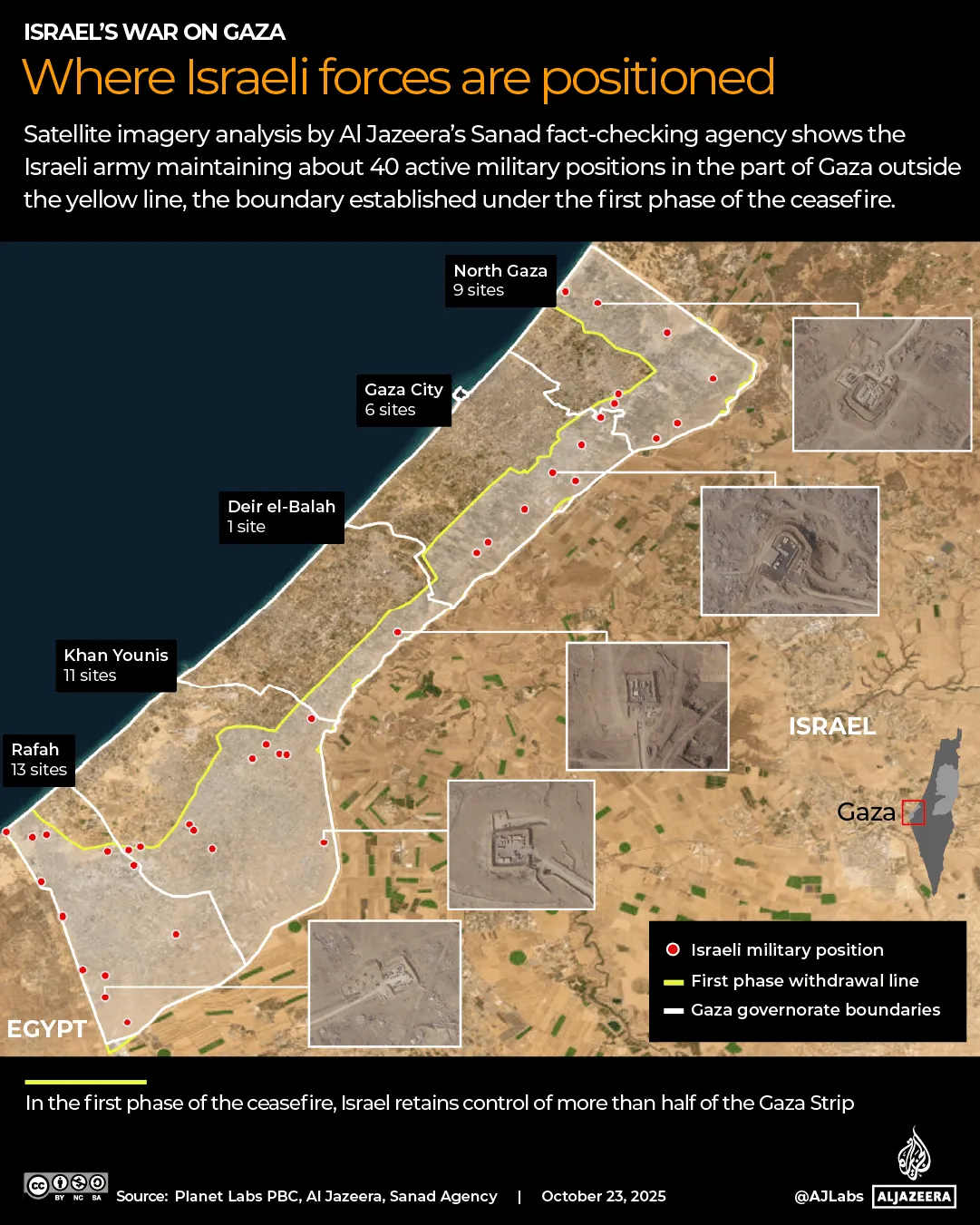
One of the most prominent military points in Gaza City is located on top of al-Muntar Hill in the Shujayea neighbourhood of Gaza City. A comparison of images between September 21 and October 14 shows the base being paved and asphalted.
Since the ceasefire took effect about two weeks ago, nearly 100 Palestinians have been killed in Israeli attacks across the Strip, with some attacks occurring near the yellow line.
On October 18, Israeli forces killed 11 members of the Abu Shaaban family in the Zeitoun neighbourhood of Gaza City, according to Gaza’s Civil Defence. Seven children and three women were among those killed when the Israeli military fired on the vehicle as the family attempted to return home to inspect it.
The Israeli military said soldiers had fired at a “suspicious vehicle” that had crossed the so-called yellow line. With no physical markers for the line, however, many Palestinians cannot determine the location of this invisible boundary. Israeli Defence Minister Israel Katz has since said the army will install visual signs to indicate the line’s location.
In the first ceasefire phase, Israel retains control of more than half of the Gaza Strip, with areas beyond the yellow line still under its military presence. This has blocked residents of Beit Lahiya, Beit Hanoon, the neighbourhoods of Shujayea, Tuffah, Zeitoun, most of Khan Younis, and all of Rafah City from returning home.
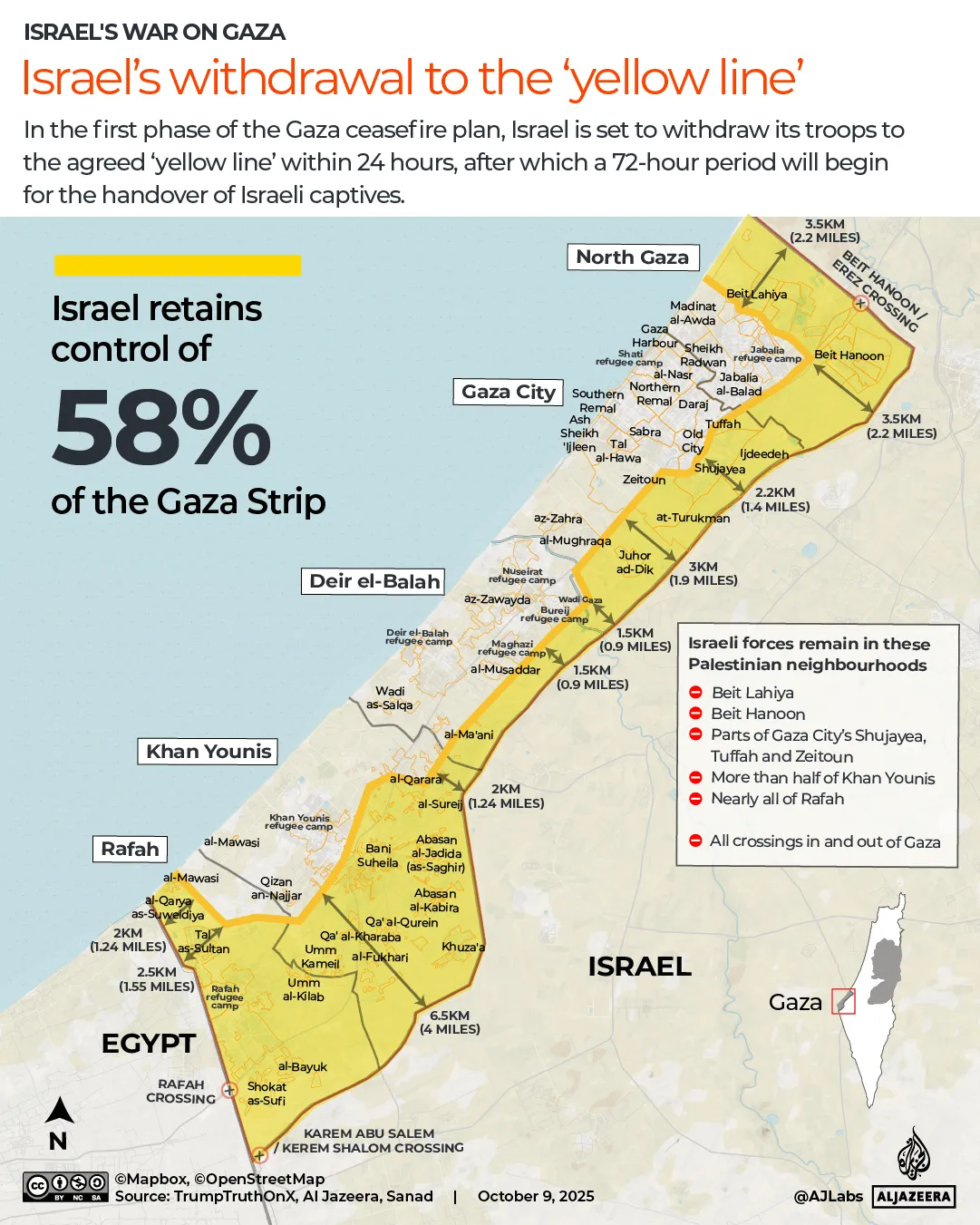
According to the 20-point plan announced by United States President Donald Trump and Israeli Prime Minister Benjamin Netanyahu on September 29 – developed without any Palestinian input – Israel is to withdraw its forces in three phases, as shown on an accompanying crude map, with each phase marked in a different colour:
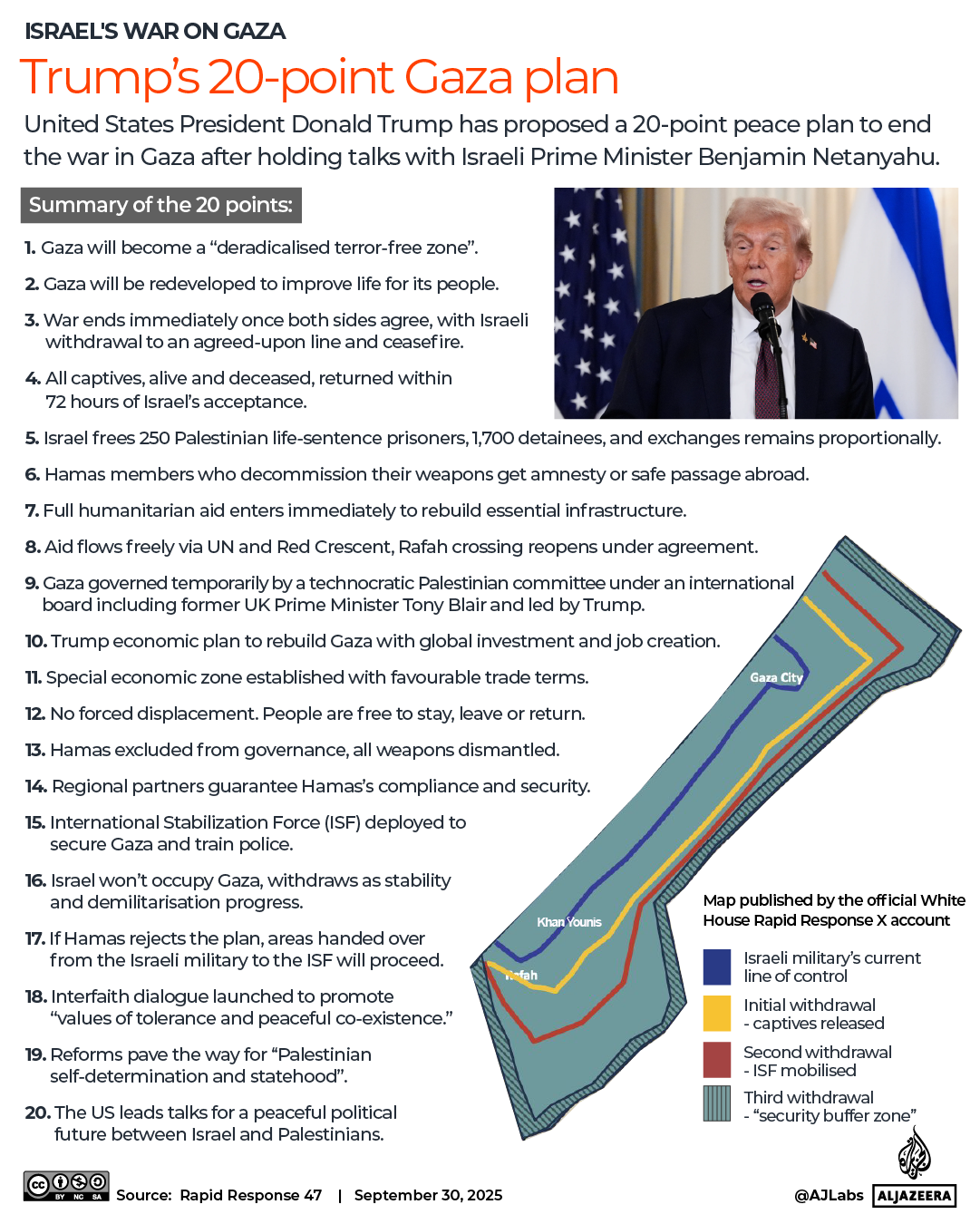
Even after the third withdrawal phase, Palestinians will be confined to an area which is smaller than before the war, continuing a pattern of Israel’s control over Gaza and its people.
Many questions remain about how the plan will be implemented, the exact boundaries of Palestinian territory, the timing and scope of Israeli withdrawals, the role of the ISF, and the long-term implications for Palestinians across Gaza and the occupied West Bank.
The plan is also silent on whether Israel gets to continue its aerial and sea blockade of Gaza, which has been in place for the past 18 years.
World Health Organization says 41 critical patients evacuated yesterday as Rafah border remains shut, despite ceasefire.
Published On 23 Oct 202523 Oct 2025
Share
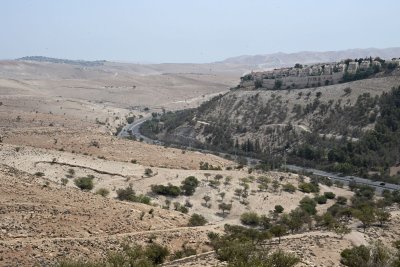
Oct. 22 (UPI) — Israel’s Knesset on Wednesday, in a preliminary vote, approved sovereignty in the West Bank for Israel, described as a political ploy by the right-wing opposition during U.S. Vice President JD Vance’s visit to the nation.
President Donald Trump said last month that he will not allow Israel to annex the West Bank.
The bill, which is called “Application of Israeli Sovereignty in Judea and Samaria, 2025,” passed 25-24 by the parliament, and was transferred to the Knesset’s Foreign Affairs and Defense Committee. It must still pass three additional votes in the plenum session.
The legislation says that “the laws, judicial system, administration, and sovereignty of the State of Israel shall apply to all areas of settlement in Judea and Samaria.”
A more limited annexation bill passed 32-9, also in a preliminary reading. The bill applies sovereignty to the West Bank settlement of Ma’ale Adumim near Jerusalem.
Militant Hamas, which controls the Gaza Strip and not the West Bank, said in a statement that the recent bill “reflects the ugly face of the colonial occupation.”
As a “flagrant violation of all relevant international laws and resolution,” Hamas said Israel “insists on continuing its attempts to ‘legitimize’ settlements and impose Zionist ‘sovereignty’ over the occupied Palestinian territories.”
In 2007, the Palestinian territories were split into two separate administrations.
Israel maintains military control of the 2,263 square miles of the West Bank, while the Palestinian Authority, led by the Fatah party, has jurisdiction over civil and security authority in specific zones, based on the 1995 Oslo Accords.
The West Bank has been divided into three zones.
Area C, which makes up about 60% the West Bank, is under full Israeli military and civilian control. Area C includes agricultural land, water springs, quarries and land for future infrastructure for Israelis.
In August, Israel approved final plans for a settlement project in E1 of Area C between East Jerusalem and the Ma’ale Adumim settlement. This arrangement would sever the West Bank for a contiguous Palestinian State, which Israel opposes as a two-state solution.
More than 500,000 Israeli settlers live in the West Bank out of the total population of 4 million.
Israel annexed East Jerusalem in 1980 and applies its civil law there, though the international community does not recognize this annexation. About 500,000 Israelis live there.
“By applying sovereignty to Judea and Samaria, we are correcting a historical wrong that is long overdue,” Avi Maoz, head of the far-right Noam party, said. “Since the government has hesitated, it is our duty as members of Knesset to act.”
All but one Likud minister boycotted the vote, with Yuli Edelstein breaking ranks to cast a decisive vote. Likud then removed Edelstein from his seat on the Knesset Foreign Affairs and Defense Committee, a spokesperson for the lawmaker confirmed to The Times of Israel.
Maoz denied a request by Prime Minister Benjamin Netanyahu to delay the vote.
Netanyahu’s Likud party said the vote was an attempt to embarrass the government while U.S. Vice President JD Vance visited the country.
“We strengthen settlements every day with actions, budgets, construction, industry, and not with words,” the Times of Israel reported by Likud. “True sovereignty will be achieved not with a show-off law for the protocol, but by working properly on the ground and creating the political conditions appropriate for the recognition of our sovereignty, as was done in the Golan Heights and in Jerusalem.”
The United Arab Emirates said in September that annexation of the West Bank would severely undermine the spirit of the Abraham Accords.
The West Bank was captured during the Six-Day War in 1967, except for East Jerusalem, as a “temporary belligerent occupation.”
The historic city of Bethlehem is in the West Bank and is under Israeli occupation. It has historic ties to the Jewish religion, as well as to Christianity and Islam.
In 2024, the International Court of Justice in The Hague issued an advisory opinion that Israel’s presence in the West Bank was unlawful under international law because it is no longer temporary.
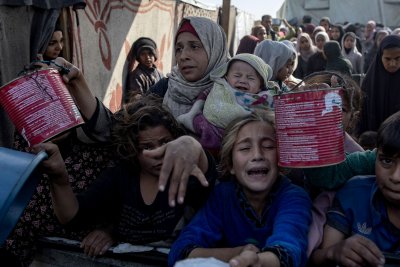
1 of 2 | Palestinians hold metal pots and pans as they gather to receive food cooked by a charity kitchen, in Khan Yunis, southern Gaza, in January. According to UNRWA, over 1.8 million people in Gaza were experiencing acute food insecurity, with acute malnutrition 10 times higher than before the war. On Wednesday, the International Court of Justice said that Israel had to allow UNRWA aid into Gaza. File Photo by Haitham Imad/EPA
Oct. 22 (UPI) — The International Court of Justice said Wednesday that Israel must allow humanitarian aid to Gaza by the United Nations.
The opinion by the United Nations’ highest court is non-binding but has moral and diplomatic weight.
It also said that Israel has not proven its allegations that the U.N. Relief and Works Agency for Palestine Refugees had a significant number of employees that were members of Hamas. The United Nations denied those claims. There are 13,000 employees of the UNRWA in Gaza.
“The occupying power may never invoke reasons of security to justify the general suspension of all humanitarian activities in occupied territory,” Judge Iwasawa Yuji said while delivering the opinion. “After examining the evidence, the court finds that the local population in Gaza Strip has been inadequately supplied.”
The Israeli Foreign Ministry said Wednesday that the opinion was “entirely predictable from the outset regarding UNRWA.”
“This is yet another political attempt to impose political measures against Israel under the guise of ‘international law,'” it added. Israel said it will not cooperate with UNRWA.
Israel has alleged that UNRWA has more than 1,000 Hamas-affiliated employees and that they teach hatred of Israel in its schools.
In December, the U.N. General Assembly asked the ICJ to decide what legal obligations Israel had regarding U.N. relief agencies. This happened after Israel’s parliament passed a law banning any UNRWA activity in Israeli territory.
Sam Rose, UNRWA’s acting Gaza director, told the BBC that the opinion “underscores the obligations of Israel under international law.”
“The ruling of today says that Israel’s laws against UNRWA have gone against those obligations, as have its actions on the ground,” he said.
While the world recognized that there was famine and starvation in Gaza last summer, Israel continued to deny it, often blocking any aid to reach hungry Gazans.
“The IDF emphasizes that there is no starvation in Gaza,” an IDF post said in July. “This is a false campaign promoted by Hamas.”
Sean Seddon,
Wahiba Ahmed and
Anna Foster
Gaza is experiencing a health “catastrophe” that will last for “generations to come”, the director-general of the World Health Organization (WHO) has warned.
Dr Tedros Adhanom Ghebreyesus told BBC Radio 4’s Today programme that a massive increase in aid is needed to begin to address the complex needs of the Strip’s population.
Israel has allowed more medical supplies and other aid to cross into Gaza since a ceasefire with Hamas came into effect on 10 October, but Dr Tedros said levels are below those needed to rebuild the territory’s healthcare system.
His intervention comes as the US attempts to shore up the ceasefire it helped to broker following an outbreak of violence at the weekend.
The agreement has been described by the White House as the first phase of a 20-point peace plan that includes an increase to the amount of aid entering Gaza, and supplies distributed “without interference” from either side.
Dr Tedros told the Today programme he welcomed the ceasefire deal but said the increase in aid that followed has been smaller than expected.
Asked about the situation on the ground, he said Gazans had experienced famine, “overwhelming” injuries, a collapsed healthcare system, and outbreaks of disease fuelled by the destruction of water and sanitation infrastructure.
He continued: “On top of that, [there is] restricted access to humanitarian aid. This is a very fatal combination, so that makes [the situation] catastrophic and beyond words.”
Asked about long-term health prospects in Gaza, he added: “If you take the famine and combine it with a mental health problem which we see is rampant, then the situation is a crisis for generations to come.”
Tom Fletcher, head of the United Nations Office for the Coordination of Humanitarian Affairs, said earlier this week that aid groups are “turning the tide on the starvation crisis” but that “far more” was needed.
On Tuesday, the UN’s World Food Programme said lorries carrying more than 6,700 tonnes of food had entered since 10 October, but that was still considerably below its 2,000-tonnes-a-day target.
Six hundred aid lorries a day need to be arriving in Gaza but the average is between 200 and 300, Dr Tedros said, as he called on Israeli authorities to “de-link” aid and the wider conflict.

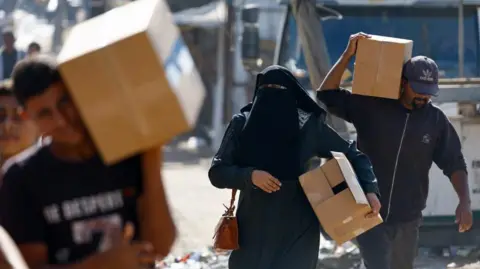 Reuters
ReutersOn Sunday, Israel temporarily halted aid deliveries after it said two Israeli troops were killed in an attack by Hamas gunmen in Gaza. Hamas said at the time it was not aware of the clashes.
The Israeli military responded with a series of air strikes across the territory, killing dozens of Palestinians.
The aid deliveries resumed the following day after heavy international pressure.
Dr Tedros said aid should not be “weaponised” and called on Israel not to impose conditions on its delivery, including over the return of the remains of dead hostages still in Gaza, which has become a key point of contention during the ceasefire.
Hamas has committed to returning the bodies but so far has transferred only 15 of 28, saying it has not been able to retrieve the rest.
Twenty living Israeli hostages were released by Hamas last week in exchange for almost 2,000 Palestinian prisoners and detainees in Israeli jails.
Dr Tedros told Today: “There should be full access, there should not be any condition, especially after all the living hostages were released, and a good part of the remains are transferred. I did not expect there would be additional restrictions.”
Asked about the role the US should play, Dr Tedros said “since the US has brokered the peace deal it has the responsibility of making sure that all sides are respecting” it.
Israel is currently operating two crossings – Kerem Shalom in the south-east, and Kissufim in central Gaza – but it has continued to face calls from aid groups for all the access routes it controls to be restored.
Dr Tedros said “all available crossings” were needed to get enough aid into Gaza, and called on Israel to allow aid groups previously been denied registration back into the territory, saying: “You can’t have a scaled up response without those who can deliver on the ground.”

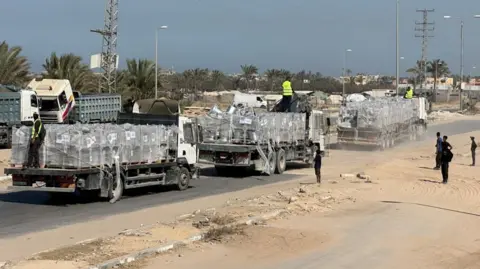 Reuters
ReutersHe also said supplies intended be used to restore Gaza’s health system have been confiscated at the border because Israeli authorities say they could have a military use.
“If you are going to build a field hospital, you need the canvas and the pillars [for tents],” he continued. “So if the pillars are removed, because of an excuse that they could be dual-use, then you can’t have a tent.”
Thousands of Palestinians are waiting for weekly medical evacuation flights, Dr Tedros said, though none have taken off for two weeks due to religious holidays in Israel. He said 700 people have previously died while waiting for medical evacuation and called on the number of flights to be increased.
Israel launched a military campaign in Gaza in response to the 7 October 2023 attack, in which Hamas-led gunmen killed about 1,200 people and took 251 others as hostages.
At least 68,229 have been killed in Israeli attacks in Gaza since then, according to the territory’s Hamas-run health ministry.
In July, a UN-backed body concluded that famine had occurred in Gaza, though Israel disputed the findings, saying there was “no starvation”.
The UN has previously estimated it will cost $70bn (£52bn) to reconstruct Gaza. Dr Tedros said around 10% of that figure would need to be spent on its badly damaged health system.
He continued: “We have been saying for a long time that peace is the best medicine.
“The ceasefire we have is a very fragile one and some people have died even after the ceasefire because it was broken a couple of times.
“What is very sad is many people were cheering in the streets because they were very happy there was a peace deal. Imagine, [some of] those same people are dead after they were told the war is over.”
Israel and Hamas have exchanged the remains of more captives, but the Palestinian group says Israel is failing to uphold the terms of the Gaza ceasefire agreement by refusing to reopen the crucial Rafah border crossing with Egypt.
The bodies of two more Israeli captives, one soldier and one civilian, were returned to Israel late on Tuesday, and identified early on Wednesday as those of Aryeh Zalmanovich, 85, and army Master Sergeant Tamir Adar, 38.
list of 4 itemsend of list
The International Committee of the Red Cross (ICRC) had earlier received the bodies in Gaza, in a handover organised by the Qassam Brigades, the armed wing of Hamas.
The Israeli military said that Zalmanovich died in captivity in Gaza on November 17, 2023, and that Adar was killed in fighting in southern Israel on October 7, 2023, and his body was taken back to the Palestinian territory.
Hamas has now handed over the bodies of 15 Israeli captives as part of the ceasefire agreement with Israel.
An estimated 13 more sets of remains are expected to be returned to Israel, although Hamas has said the widespread devastation in the Palestinian territory and the Israeli military’s continuing control of certain parts of Gaza have slowed the recovery of the bodies.
The Palestinian group also released 20 living captives in one day at the start of the ceasefire.
Earlier on Tuesday, the bodies of 15 Palestinians killed in Israeli detention were returned to Gaza, where they were taken to the Nasser Medical Complex for identification, according to a medical source.
Under the ceasefire agreement, Israel released some 2,000 living Palestinian detainees from Israeli prisons, and has committed to releasing the remains of 360 more deceased Palestinians.
A forensics team that received the bodies of some 45 Palestinians returned by Israel last week said that some arrived still shackled and bearing signs of physical abuse and possible execution.
Ubai Al-Aboudi, the executive director of the Bisan Center for Research and Development, said that Palestinians imprisoned by Israel should also be considered to be “hostages”.
“This entire system dehumanises Palestinians,” Al-Aboudi told Al Jazeera from Ramallah, adding, “when we talk about Palestinian prisoners, we are actually talking about hostages”.
Al-Aboudi noted that about 20 percent of the Palestinian population has been arrested or detained by Israel over the decades, and that the situation in Israeli prisons has deteriorated dramatically since the war on Gaza began in October 2023.
“Most of them are held without any due process, without being charged, and just based on military orders by a foreign military occupation,” he said.
A delegation of Hamas officials, attending talks with Turkish officials in Qatar on Tuesday, said that the Palestinian group remains committed to the ceasefire deal despite Israel’s “repeated violations”.
Israel is delaying the implementation of the ceasefire by failing to open the Rafah crossing “for the travel of sick and injured people, and its prevention of the entry of humanitarian aid into Gaza”, the Hamas officials said in a statement.
Mujahid Muhammad Darwish, head of the Hamas delegation, also highlighted “the inalienable rights of our people to self-determination and their right to an independent state with Jerusalem as its capital”.
Turkiye was among the signatories of US President Donald Trump’s document on the Gaza ceasefire deal earlier this month in Egypt’s Sharm el-Sheikh.
The Rafah crossing has remained closed since May 7, 2024, when it was seized by Israeli forces as they invaded the city of Rafah in the Gaza Strip’s south, where close to one million people were sheltering at the time.
The United Nations has described the crossing, which connects the Palestinian territory to Egypt, as one of two “arteries” for humanitarian access.
The UN’s highest court, the International Court of Justice (ICJ), ordered Israel to reopen the Rafah crossing on May 24, 2024, following an emergency submission from South Africa, but the crossing has remained closed, with only limited access via the adjacent Karem Abu Salem crossing.
Residents of Rafah were only able to return to the destroyed city after a temporary ceasefire began on January 19, 2025, which also saw the Rafah crossing temporarily reopen to allow medical evacuations in February, before Israel issued new forced evacuation orders for Rafah at the end of March.
The crossing has remained closed for humanitarian aid access since May 2024.
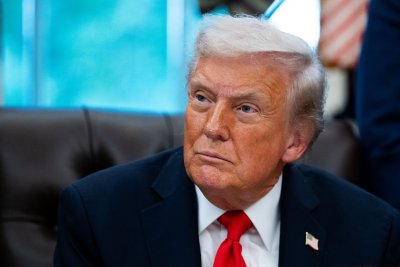
Oct. 21 (UPI) — President Donald Trump accepted the Architect of Peace Award from the Richard Nixon Foundation during a closed ceremony at the White House on Tuesday morning.
Trump earned the award due to his central role in negotiating the current cease-fire deal between Hamas and Israel to end the unchecked war in Gaza that began when Hamas attacked Israel on Oct. 7, 2023, CBS News reported.
Award presenters included former President Richard Nixon’s daughter, Tricia Nixon Cox, former national security adviser Robert O’Brien and acting U.S. archivist Jim Byron, CBS News reported.
Trump had argued he deserved to receive the Nobel Peace Prize for securing a cease-fire in Gaza and ending other wars.
Among wars that Trump has said he ended are those between Cambodia and Thailand, the Congo and Rwanda, Israel and Iran, India and Pakistan, Egypt and Ethiopia, and Armenia and Azerbaijan, and Serbia and Kosovo, the president told the U.N. General Assembly on Sept. 24.
The Nobel Peace Prize went to Venezuelan opposition leader Maria Corina Machado, who opposed Venezuelan President Nicolas Maduro in that nation’s 2024 presidential election, which exit polling suggests Machado won despite Maduro’s victory claim.
The Architect of Peace award is not given annually but instead when foundation representatives decide one has been earned by those who “embody [Nixon’s] lifelong goal of shaping a more peaceful world,” according to the Architect of Peace Award website.
The award last year honored former President George W. Bush, Farah Pahlavi and Reza Pahlavi.
Bush received the award for establishing the President’s Emergency Plan for AIDS Relief, which globally has saved millions of lives.
The Pahlavis received the award for championing a secular Iranian government, religious freedom and human rights, according to the Nixon Foundation.
Farah Pahlavi is Iran’s former queen, while Reza is her son.
Mahmoud Khalil, a pro-Palestinian activist and US resident, appeared before a federal appeals court in Philadelphia as Trump administration lawyers push to deport him. His case, tied to campus activism at Columbia University, has become a test of free speech and political dissent rights.
Published On 21 Oct 202521 Oct 2025
Share
US Vice President JD Vance says, one week into the Gaza ceasefire, he has “great optimism” the peace deal will hold. He declined to set a deadline for Hamas to disarm. Vance was speaking at a newly established centre in Israel for civilian and military cooperation.
Published On 21 Oct 202521 Oct 2025
Share